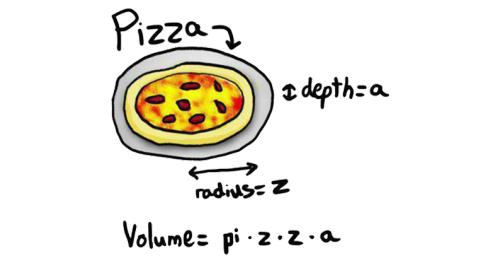I'm slow to add new people, and most of those I've added because someone else retweets them often. And I've dropped a few for differing reasons. Generally, they tweet so much that it seems that they're the only one there, or they always tweet the same thing and never have anything new to say, or they get really, really opinionated about things (whether or not it's an opinion I agree with or not ... but usually not).
The people left are mostly educators who found my blog by word of mouth. I like reading those. It gives me hope that after a dozen years, there are still things that will get better.
And often, fellow math teachers will have a similar sense of humor. Which brings me to the topic at hand.
Yesterday, someone retweeted a comic he'd found on the Net. It's one I've seen before. That exact one. It was black and white and someone had typed a large x2 and x3, and the former was asking the latter, "Do you believe in God?" and the latter said, "Well I do believe in higher powers..."
Hysterical! At least, that's what I thought back in 2008! When I wrote it! Titled Math and Religion, my "x"s had faces to talk with, but the wording is almost exact. It was a interesting transformation: not quite a translation ... more like diluting.
There's nothing to do except be "flattered" by this "sincerest form". Even with the serial numbers filed off, along with my signature, title, border, copyright notice . . . No, not bitter at all.
It gave me a chance to follow up with the original and put myself out there, so that's a positive, I guess.
But it did make me think about "imitation". Not all imitation is sincere. This wasn't a case of someone trying to be like me: they just took the joke. Have I taken ideas from other people? Sometimes, but usually I've said something like, "Oooo, I have to use that." (And I haven't used everything I've said I would.) But then I make it my own. I add something to it. Put a twist on it. Something. Or I don't do it.
For instance, have you heard the one about the Volume of a cylinder equaling pi * z * z * a?
I've mentioned it before, and I think I posted a copy of it:

That was the first version of it I saw. That was good, and I wasn't in a position to make it better. Back then, if I'd tried to imitate that, it would have been a poor copy. It would've looked like a circle or oval and not a pizza. On the other hand, if you search images for "volume pizza", you'll get a lot of variations. Pity. Actually, I wish I knew who did the original so I can credit them.
Moreover, a lot of imitation in the classroom isn't intended to be flattering. Sure, there are some students who imitate the way I solve problems, but that's not a matter of flattery. That's a matter of learning. And that's not what I'm talking about anyway. No, I'm talking about the people who mimic each other (including me) in dopey voices with exaggerated gestures. If they nailed any particular habit or vice of mine, maybe I would be flattered. Problem is tha they don't know enough to make the copy. They won't put the required effort in.
That does sound a little familiar. Not putting in any effort is the reason that they have so much time practicing their mimicry!





























